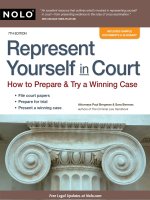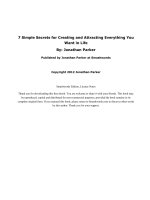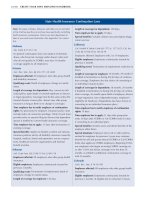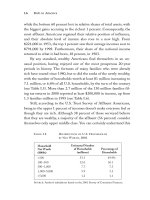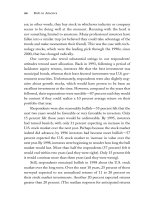Rich in America Secrets to Creating and Preserving Wealth PHẦN 9 doc
Bạn đang xem bản rút gọn của tài liệu. Xem và tải ngay bản đầy đủ của tài liệu tại đây (179.64 KB, 30 trang )
informed when they make these kinds of decisions. Eventually, after
hearing about the difficulties that can occur with court-appointed
guardians, he rethought his plan and made a sensible guardian selec-
tion. But he continued to refuse to leave his children any money.
Another wealthy couple who came in to see us recently had a dif-
ferent attitude. They had begun their estate planning many years ago
with another advisor and appreciated the power of giving money to
their two children while they were still alive (currently an individual may
give up to $11,000 and a couple may give up to $22,000 per recipient
each year without incurring a gift tax).
This couple couldn’t have been nicer and more considerate. Their
only problem was that they had given away so much of their money
that they now had to ask their kids to give some of it back. It wasn’t
that they needed the money to live on because they had already taken
those expenses into consideration. But this couple had established a
lifetime habit of donating to charity, and had come to realize that
they no longer had enough money to continue giving as they wished.
The situation was embarrassing for them, although their children—
grateful for everything their parents had done for them—had no
problem with the request. The couple just hadn’t thought through
their planning carefully enough to determine the cash flow they really
needed to give to charities in the manner to which they had grown
accustomed.
The Importance of Estate Planning
As these stories illustrate, estate planning is the most subjective of
the wealth management and financial planning disciplines. Decisions
often must be made without the benefit of empirically correct answers
that are available when balancing issues surrounding, say, income
taxes or retirement. Think of all the personal questions that must be
addressed:
190 Rich in America
06 Chapter Maurer 6/20/03 5:19 PM Page 190
• Do I leave my assets outright to my spouse or in a trust? If I
don’t leave them in a trust, how do I know my spouse will leave
my assets to our children?
• At what age should my children receive their inheritance?
Should it be in a trust or outright?
• Who should be my executor and trustee?
• Who should be the guardian of my minor children?
For estate planning to be successful, you must be able to answer these
and other difficult questions as you work with your estate planner to
draw up a plan that is both sound and tax-efficient.
As mentioned earlier, many people procrastinate when it comes to
financial planning. They procrastinate even more over estate planning
because it’s uncomfortable to focus on death. They’re involved in run-
ning their lives, building their wealth, and advancing their careers. Few
people look forward to taking the time out to discuss their mortality.
But if you don’t attend to estate planning, all those assets you’ve spent
your life accumulating may wind up somewhere that might make you
turn over in your grave.
Good estate planning begins with a few dispassionate questions
asked from an appropriate distance. Think of it as if you were standing
on top of a mountain, looking down on your life. From this perspec-
tive, ask yourself:
• What are my assets?
• Who are the objects of my affection?
• What are my goals and objectives?
Once you understand the answers to these three general questions, you
can work out the specifics of what else needs to be done. If you can’t
answer them yourself, any good estate planner will sit down with you
Estate Planning 191
06 Chapter Maurer 6/20/03 5:19 PM Page 191
and try to gain some insights into who you are, what you care about,
and what your concerns are. For example, are you philanthropic? What
type of relationship do you have with your family? What do you think
money should be used for? Your response to these subjective issues will
help your estate planner home in on more concrete objectives.
Each family has distinct concerns that will affect its estate plan-
ning choices. For instance, one of our clients, Ben, emigrated to the
United States as an impoverished young man. With the help of a gov-
ernment agency he’d been able to set himself up in a small business;
eventually, it grew to the point that Ben became a terrifically wealthy
man. He felt very indebted to the government for his success and as a
result, Ben didn’t think there was enough he could do for this country,
and paying taxes was the least of it. This sentiment had a powerful
impact on his estate planning, because every time we showed him how
to lessen his tax bite, he objected. Ben did want to make sure that his
children and not the government received his business, but he didn’t
care how much they had to pay in taxes to get it.
Then there was the case of Dolores, a single mother who had lost
her husband many years ago and never remarried. She had two chil-
dren, a son with whom she remained on good terms, and a daughter,
Christina. Dolores and Christina had fought many years earlier, and
outside of a frosty exchange of Christmas cards, they had barely any
contact. Dolores was wealthy enough to leave a significant estate.
She knew her son could handle the money well—he was a successful
lawyer with a family of his own—but she was worried about Christina,
who never had any money, and whose soft heart might make her an
easy mark once she inherited Dolores’ wealth.
Dolores had never given her children as much as a penny. So, as
part of her estate planning, we suggested that she should give her
daughter cash gifts to the maximum allowed, which at the time
was $10,000 a year. This way she could see how Christina handled
it. Dolores did as we asked, and she received a gracious thank-you
192 Rich in America
06 Chapter Maurer 6/20/03 5:19 PM Page 192
from her daughter. Over the next decade Dolores continued to give
Christina the maximum allowable tax-free cash gift, and slowly, the
two women began to establish an uneasy but constant relationship.
Furthermore, Christina turned out to be quite smart about managing
her newfound money.
Obviously, no boilerplate formula can take into account all situa-
tions like these. Your life circumstances are as particular to you as your
fingerprints. What do you want to do with your wealth? Other than
your family, whom do you want to inherit your assets? Industrialist
Paul Mellon left several million dollars to his horses, as well as several
million more to his dogs.
To make sure your estate planning is complete, don’t just jot down
a general list of your assets. Take a complete and specific inventory:
your bank and investment accounts, insurance policies, company bene-
fits, IRAs, tangible personal property, real estate, etc. If you have
already begun this itemization process through financial planning, you
can use the same information you’ve already gathered. This may sound
easy enough, but it requires work, and we’ve found that clients often
encounter some difficulty pulling together all the data. Furthermore,
many clients simply don’t want to do it because they value their privacy
and are loath to reveal their whole financial picture to anyone.
You also need to decide who will be the recipient, or beneficiary, of
each and every asset, and make sure that you have all your beneficiary
designations completed and ready for review—your IRA, your life in-
surance, your property ownership, and so on.
You also should consider how you wish your instructions to be
interpreted. Often, people really can’t anticipate precisely what the
next generations will, much less should, do with their inheritance.
U.S. Trust once administered a trust that provided for the beneficiary,
Carola, to receive payments to provide for her “health, education, main-
tenance and support.” At a certain point in her life, Carola wanted to
build a small gymnasium in her basement so she could exercise more
Estate Planning 193
06 Chapter Maurer 6/20/03 5:19 PM Page 193
often. Funds for a gym weren’t expressly granted in the trust, but one
member of our staff had known the original family well, and it was
clear to him that the decedent’s intentions were such that she would
approve, so we obtained a letter from Carola’s doctor stating that it
would be to her medical benefit to have the gymnasium.
Such situations are why we recommend using the broadest pos-
sible language in wills, trusts, and the like. If you make the language
flexible, you give the document the ability figuratively to live and
breathe over time. The more restrictive you are about the way your
194 Rich in America
Six Things You Must Know about Estate Planning
1. If you die without a will, state law will determine who will
receive your property, which may not be in accord with your
wishes.
2. The marital deduction provides that you can transfer unlim-
ited amounts of property to your spouse (providing he or she
is a U.S. citizen) without incurring gift or estate tax at the
time of the transfer (see the sections on QTIP trusts in this
chapter).
3. You may give a gift of up to $11,000 a year without incurring
gift tax. This is known as the annual exclusion.
4. In 2003 (assuming you have not made any taxable transfers
during your lifetime), you can leave up to $1 million to per-
sons other than your spouse without having to pay any fed-
eral estate tax. This amount will increase incrementally until
it reaches $3.5 million in 2009.
5. The Federal estate tax will be eliminated in 2010 and rein-
stated in 2011.
6. Trusts are not only for the very affluent.
06 Chapter Maurer 6/20/03 5:19 PM Page 194
assets can be used, the greater the possibility that you will hamstring
the recipient. Not that some people don’t have that exactly in mind—
they make sure that their wishes will be remembered from the grave.
We’ve seen wills that tell people whom they can or can’t marry, and
after whom they should name their children. One man who felt his
children weren’t serious enough about getting an education created an
inheritance reward program hinged on how far the kids advanced in
school—they received so much money if they graduated from college,
more for earning a professional degree, and even more if any of them
obtained a Ph.D. We had another client who didn’t seem to trust his
son, and in his will dictated every detail of how the inheritance could
be used, from where the son could buy a house to what kind of car he
could drive.
Choosing an Executor
However large or small your estate, it’s important to make sure that
you pick a responsible executor for your estate. An executor has many
duties. He or she must locate the will and make sure it is properly pro-
bated, i.e., that the will is proven to be legally valid.
Next, all the assets specified in the will must be collected and
appraised. Although some people keep meticulous records, making
their estates easy to compile, others have assets scattered all over the
world, some of which no one—not even the deceased—was ever aware
of (if you select a competent wealth manager and keep up with your
financial planning, that shouldn’t be a problem for you).
The role of executor can be a difficult one, particularly if he or she
has to dole out unpleasant or surprising news to unsuspecting heirs (or
those who thought they would be heirs, but aren’t). Occasionally, the
executor may be given the rather odd job of telling the heirs details
about the deceased that may surprise or disappoint them. We had a
client who was a Boston-area schoolteacher; his wife was an account-
Estate Planning 195
06 Chapter Maurer 6/20/03 5:19 PM Page 195
ant. Together they had one daughter, one dog, and one Chevrolet they
drove into the ground. The family lived in a small home outside the
city, and seldom spent any money.
Isabelle, the daughter, grew up expecting little, although the fam-
ily had made sure she received an excellent education. She then be-
came a high school teacher, and a single mother when she and her
husband divorced not long after their baby was born. Isabelle’s parents
sent her a small sum of money now and then, and she made enough to
support her child.
However, when the parents died, Isabelle learned the truth: They
had been excellent investors, and over the course of their lifetime had
accumulated about $5 million. Isabelle was thrilled to inherit such a
large amount of money. But it seemed a slap in the face to learn this only
courtesy of the executor, and wrestle with why her parents hadn’t been
more generous to her or their granddaughter while they were alive.
The executor may have to perform several other duties. For exam-
ple, it will take time for the deceased’s house to be sold or transferred,
so mortgage payments on the house must be continued. Bills for water,
heat, and electricity must be paid (unless you want to inventory the
contents in the dark). Insurance premiums must be kept current (in
case the house is burgled before the division of assets is complete). The
executor will have to change the name of all of the decedant’s accounts
to estate accounts and open a bank account for the deceased’s estate so
that fees and payments are covered and there is a repository available
for any money that may still come into the estate, such as dividends,
bonuses, and salaries. Finally, the executor is responsible for preparing
the decedent’s final income tax returns, preparing the estate tax returns,
and paying all funeral expenses, debts, and administration expenses.
Once the administration of the estate is complete, the executor dis-
tributes the estate’s assets. When making your choice of executor, re-
member that the tasks with which you charge this person may have a
strong, sometimes negative impact on those who receive (or don’t re-
ceive) your assets—and the executor may bear the brunt of these feelings.
196 Rich in America
06 Chapter Maurer 6/20/03 5:19 PM Page 196
Trusts
One of the most prevalent estate planning tools is the trust. A trust is
simply a contractual agreement requiring the administration and dis-
position of property. The typical parties to a trust are the grantor, the
trustee, and the beneficiaries. There are two types of trusts: a testamen-
tary trust, which you establish in your will, and an inter vivos trust,
which you create during your lifetime. An inter vivos trust may be rev-
ocable, which means that it can be changed, or irrevocable, which means
that it cannot be changed. A testamentary trust is not effective until
you die, and is irrevocable thereafter. This is because you can change
your will as many times as you wish before you die; you can’t afterward.
One advantage of a revocable trust is that you can avoid probate.
The probate process means that a will may become a public document,
which anyone then may ask to see. A revocable trust is not public, so
it can provide confidentiality. Note, however, that this confidentiality
is not absolute. Some states require that a copy of the revocable trust
be filed along with the will, if the will contains a bequest to the revo-
cable trust.
Another advantage of a revocable trust is that it provides the abil-
ity to avoid delays in the administration of your estate. Until your will
is admitted to probate by the court, your executor or personal repre-
sentative has no authority to take any actions with respect to the assets
of your estate. But if the bulk of your assets are held in a revocable trust
at your death, any delay encountered in probating your will will have
no effect on your trustee’s ability to administer the assets therein.
Revocable trusts are quite popular in states such as California, where
the probate process is particularly onerous and time-consuming. Most
people do not own all of their assets through a revocable trust, how-
ever. Accordingly, even if you choose a revocable trust as your vehicle,
you must still execute a will in order to dispose of those assets that
you don’t own through your revocable trust. The final advantage of a
revocable trust is that in the event of your disability or incompetence,
Estate Planning 197
06 Chapter Maurer 6/20/03 5:19 PM Page 197
someone else can step in and take over for you, allowing continuous
management of your property.
If your estate is going to include a trust, you should appoint a
trustee. A trustee will be the person or institution who will take respon-
sibility for the trust, administering it in accordance with the trust’s
terms. He or she either hires a professional to act as agent or invests
assets, makes distributions to beneficiaries, and files tax returns alone.
In return, the trustee receives a fee for his or her ser-vices. You must
make sure that your trustee is someone in whom you have complete
confidence. In many cases, an institution such as a bank is your best
choice for a trustee, because it has both the procedures and the experi-
ence to administer a trust and invest the assets. Moreover, the institu-
tion will be there to serve multiple generations. I personally believe the
best solution is to involve an institution and a trusted individual or fam-
ily member to serve as executor and trustee. The individual executor or
trustee, either alone or in connection with the beneficiaries, should also
be able to remove a corporate fiduciary and replace them with a differ-
ent corporate fiduciary. In addition, the beneficiaries should have a
similar right to remove and replace corporate, as well as individual,
trustees. In this case all beneficiaries should agree with the action in
order to have this right. There may be adverse tax effects if this provi-
sion is not drafted appropriately in the trust or will. Once you have set
up a trust and selected a trustee, again, make sure that the language in
your will is flexible so the trustee can make necessary changes as con-
tingencies arise.
U.S. Trust had one case in which a grandmother created a trust
for her daughter and her daughter’s two children, a boy and a girl.
According to the terms in the trust, the mother was able to access the
capital only for medical emergencies. The grandchildren, however,
were able to use it for “support” and “lifestyle.” For the most part, all
went smoothly, until the female grandchild decided that she wanted to
have a baby. Unfortunately, for various medical reasons she was not
able to become pregnant except through in vitro fertilization, which
198 Rich in America
06 Chapter Maurer 6/20/03 5:19 PM Page 198
can be extremely expensive, especially if the first attempt doesn’t work.
She was looking at bills of upward of $50,000. Theoretically, accord-
ing to the trust, this woman could not claim medical reasons for dip-
ping into her trust principal.
As trustee of the will, we sat down and had a long discussion.
Ultimately, we decided that the woman’s ability to have a child could
be considered part of her general support and lifestyle. And, of course,
we were certain that her grandmother, who had selected us to be the
trustee in the first place, would have loved her granddaughter to have
a family of her own. Taking care of her heirs was truly the concern of
the trust in the first place. We made a decision to distribute the funds,
and our client eventually had her baby.
Power of Attorney
A power of attorney offers you a relatively simple and inexpensive
mechanism by which you can appoint one or more persons to act on
your behalf in a variety of financial and legal affairs. These powers may
be broad or limited, depending on your wishes. For estate planning
purposes, you also can allow this person to make gifts on your behalf.
A durable power of attorney is one that remains effective even if you
become incompetent. In such a situation, the durable power may let
you avoid a situation in which a court appoints a guardian to manage
your property. In this context, the durable power also serves as a sim-
ple substitute for a revocable trust, which can also provide for the
management of your property in the event of incompetence. Upon
your death, the power of attorney ceases.
As with selecting an executor or trustee, since the power of attor-
ney confers significant authority on the agent, you must take care in
choosing the right individual. If you don’t want to confer immediate
authority, you can use a springing power of attorney. This means that
the power takes effect only upon the occurrence of a specified event,
such as disability.
Estate Planning 199
06 Chapter Maurer 6/20/03 5:19 PM Page 199
Although power of attorney is a useful option for handling finan-
cial and legal matters, it is generally not used to convey medical deci-
sion-making authority. In order to authorize someone to make your
medical decisions, you should use a health care proxy. This document is
typically executed in conjunction with a living will, which contains a
statement of your wishes regarding life support and similar measures.
The laws regarding powers of attorney, health care proxies, and living
200 Rich in America
Why You Should Have a Living Will
A living will does not dispense assets or establish trusts; it ex-
presses your wishes in case you need life-sustaining treatment, or
any other urgent medical care for a serious condition. As such it
should be viewed as part of estate planning.
Let’s say you’ve been in a terrible accident and can only be
kept alive with artificial life support. You may not wish this kind
of treatment, but you’re in no condition to say so. Only through
a living will can this kind of decision be made by someone else—a
decision informed by your wishes. As mentioned, a health care
proxy is the document in which you choose an agent to make these
decisions; in turn, the agent is guided by what is in the living will.
A piece of advice: Let the person whom you’ve picked to
make these life-and-death decisions know ahead of time what is
expected. It can be quite a surprise to find out that you’re respon-
sible for a choice that might have to be made in a matter of hours.
As with power of attorney, you should use a lawyer to draft
these documents. Make copies of the living will and the health
care proxy, and make sure that they’re accessible when needed.
You also might want to consult with your physician about your
choices, particularly if you have a chronic health condition. In fact,
it makes sense to give your doctor copies of these documents when
they are drafted.
06 Chapter Maurer 6/20/03 5:19 PM Page 200
wills vary from state to state. Consult with your attorney to make cer-
tain you are in compliance with applicable law.
Tax Laws and Estate Planning
Now that you understand the broad considerations of estate plan-
ning, you can make specific financial decisions that will be most tax-
advantageous and financially lucrative for you and your beneficiaries.
Changes to the tax laws are an important consideration.
In 2001 the government made sweeping changes to the federal
transfer tax system. From 2002 to 2009, the estate, gift, and generation-
skipping transfer tax will be reduced. In 2010, the estate and generation-
skipping transfer taxes will be repealed, although the gift tax will remain
in effect. Beginning in 2011, the estate, gift, and generation-skipping
transfer taxes will revert to their form before the 2001 legislation (see
Table 6.2).
In light of this, as previously noted, one of the best and most tax-
efficient strategies for estate planning, if you want as much money as
Estate Planning 201
2002 $1 million $1.0 million $1.1 million
2003 $1 million $1.0 million $1.12 million
2004 $1 million $1.5 million $1.5 million
2005 $1 million $1.5 million $1.5 million
2006 $1 million $2.0 million $2.0 million
2007 $1 million $2.0 million $2.0 million
2008 $1 million $2.0 million $2.0 million
2009 $1 million $3.5 million $3.5 million
2010 $1 million (Tax repealed) (Tax repealed)
2011 $1 million $1 million $1 million**
Calendar
Year
Gift
Tax Credit
Estate
Tax Credit
GST*
Tax Exemption
*Generation-skipping tax.
**To be adjusted for inflation.
TABLE 6.2 GIFT AND ESTATE TAX CREDIT
06 Chapter Maurer 6/20/03 5:19 PM Page 201
possible to go to loved ones, is to start giving gifts of money. Individuals
are permitted to give away $11,000 per recipient annually without pay-
ing gift tax; a married couple can give $22,000. The earlier the gift is
made, the greater the potential tax savings may be. Suppose you give
$22,000 to your child when he or she is very young, and that money
grows to more than $250,000 by the time you die. That $250,000 is not
considered part of your estate. So no estate tax will be due on the money.
Under current tax law, you will have to pay a gift tax if you give
away more than $1 million worth of property during your lifetime (not
including the annual exclusion, gifts to a U.S. citizen’s spouse, another
person’s tuition payments or medical bills, and charitable gifts). If you
are married, each spouse may make the gift of $1 million. There are
many vehicles available to you to maximize the value of that $1 million
exclusion, such as family limited partnerships, grantor retained annu-
ity trusts, and charitable trusts, discussed below.
Estate Planning Options
Based on the current transfer tax laws, the estate and gift tax can be
viewed as a voluntary tax. By that I mean that there are so many tech-
niques available to minimize transfer taxes that you can go a long
way toward eliminating transfer taxes. There are trade-offs in order to
accomplish this goal, the most significant being the transfer of your
assets from your own name into trusts or other vehicles. Most people
are not willing to make that trade-off. They enjoy the control and the
power and therefore still end up with very large estates.
Here are a few basic estate planning vehicles that you may want to
consider as you prepare your own estate planning (see Table 6.3) (these
definitions are abbreviated for easy reading—to learn about each in
full detail, please consult with an expert on the subject):
Estate tax credit: Full use of this credit avoids taxation of the property
in the surviving spouse’s estate when he or she later dies. To obtain the
202 Rich in America
06 Chapter Maurer 6/20/03 5:19 PM Page 202
maximum advantage from this credit, each spouse should have assets
in his or her own name equal in value to the unified credit. This estate
planning technique is most commonly accomplished by a will provi-
sion using a formula.
Marital deduction and the QTIP trust: This technique allows estate tax
to be deferred until the death of the surviving spouse. If he or she is a
Estate Planning 203
TABLE 6.3 BENEFITS OF TRUST
Trust Benefits Timing
Charitable lead trust
•
Income tax charitable
deduction
•
Excess appreciation to
non-charitable
beneficiaries
Lifetime or at death
Charitable remainder trust
•
Income tax charitable
deduction
•
Deferral of capital gains
tax if assets sold
Typically lifetime
Children’s trust
•
Management of assets
•
Control over distributions
•
Creditor protection
Lifetime or at death
Generation–skipping trust
•
Avoidance of estate tax in
child’s estate
•
Creditor protection
Lifetime or at death
Grantor retained annuity
trust (GRAT)
•
Excess appreciation
removed from estate
Lifetime
Life insurance trust
•
Avoidance of estate
taxation of insurance
proceeds
Lifetime
Qualified personal
residence trust (QPRT)
•
Transfer of residence for
less than fair market value
Lifetime
Qualified terminable
interest property (QTIP)
trust
•
Deferral of estate tax until
surviving spouse’s death
•
Control over distribution
at surviving spouse’s death
Typically at death
Revocable trust
•
Property management in
case of disability
•
Avoidance of probate at
death
Lifetime
Unified credit trust
•
Avoidance of estate
taxation in surviving
spouse’s estate
Lifetime or at death
06 Chapter Maurer 6/20/03 5:19 PM Page 203
U.S. citizen, the marital deduction is unlimited in amount and can be
obtained by making an outright bequest or by placing assets in a qual-
ifying trust, usually a qualified terminable interest property (QTIP)
trust. The surviving spouse must receive all the income from the trust
and may receive discretionary principal payments. The QTIP trust has
the advantage of allowing the first spouse to control the ultimate dis-
position of the property.
Tuition and medical exclusion: Tuition payments made directly to an
educational institution and medical care payments made directly to
the provider are exempt from the gift tax. This exclusion is unlimited
in amount, and does not affect the gift tax annual exclusion.
Life insurance trust: This technique avoids estate taxation of life insur-
ance proceeds in the estates of both spouses. In order to implement it,
an irrevocable trust must be the owner and beneficiary of the life
insurance policy. The grantor (the insured) may not be the trustee of
the trust. At the death of the insured, the proceeds of the policy are
paid to the trust and disposed of pursuant to the trust terms. (Table 6.4
illustrates the savings from an insurance trust stragety.)
Grantor retained annuity trust (GRAT): Through a GRAT, a grantor
transfers property to a trust and retains an annuity for a chosen term of
years. If the trust is structured properly, the creation of the GRAT gen-
erates little or no gift taxes. For this technique to succeed, the grantor
must survive the trust term. If the trust property appreciates at a rate
in excess of the IRS prescribed interest rate, the excess appreciation
passes to the remainder beneficiaries free of gift tax.
Personal residence trust: This technique allows an individual to transfer
a personal residence for less than its full value.The individual transfers
a residence to a trust for a term of years and retains the right to live in
the residence. At the end of the term, the residence passes to the trust
beneficiaries. If the individual desires to remain in the residence after
204 Rich in America
06 Chapter Maurer 6/20/03 5:19 PM Page 204
Estate Tax Calculation
Current Plan with
Credit Shelter Trust
Proposed Plan CST Funded
and an Insurance Trust
Y
ear of Death - 2003
Client
Spouse
Client
Spouse
Gross Estate
$10,000,000 $5,000,000
$8,500,000
$5,000,000
Inheritance From Spouse
—
8,800,000
—
7,330,000
Funeral and Admin. Expenses (2%)
(200,000)
(276,000)
(170,000)
(246,600)
A
djusted Gross Estate
9,800,000 13,524,000
8,330,000
12,083,400
Charitable Deduction
0
0
0
0
Marital Deduction
(8,800,000)
0
(7,330,000)
0
T
axable Estate
1,000,000 13,524,000
1,000,000
12,083,400
Post–1976 Taxable Gifts
0
0
0
0
Federal Estate
1,000,000 13,524,000
1,000,000
12,083,400
Federal Tax Per Schedule
(345,800) (6,427,560)
(345,800) (5,721,666)
A
fter 1976 Gift Taxes
0
0
0
0
Unified Credit
345,800
345,800
345,800
345,800
Federal Tax + Max Credit
0
(6,081,760)
0
(5,375,866)
State Death Taxes—Max
Credit
0
820,120
0
704,872
T
otal Federal Death Taxes
0
(5,261,640)
0
(4,670,994)
State Death Taxes Per Schedule
0
(820,120)
0
(704,872)
Net Income Tax on IRD
0
(135,000)
0
(135,000)
T
otal Death Taxes
0
(6,216,760)
0
(5,510,866)
Family Share
1,000,000
7,307,240
1,000,000
6,572,534
Family Share—Both Spou
ses
—
8,307,240
—
7,572,534
Irrevocable Insurance Trust
—
—
1,500,000
T
otal Family Share
$8,307,240
$9,072,534
Benefit of Irrevocable Life
Insurance Trust:
$765,294
T
ABLE
6.4 S
AVINGS FROM AN
INSURANCE
T
RUST
S
TRATEGY
205
06 Chapter Maurer 6/20/03 5:19 PM Page 205
the end of the term, he or she must pay full fair market value rent to the
trust beneficiaries.
Valuation discounts: Here you can transfer assets to a family limited
partnership (FLP) or limited liability company (LLC). As the general
partner or managing member, you retain control of investments and
distributions. You give interests as gifts to family members, either out-
right or in trust. Because these interests are not marketable and are not
controlling interests in the FLP or LLC, valuation discounts are avail-
able for gift tax purposes.
Charitable remainder trust: In a CRT, you transfer property to a trust
that makes payments to one or more individuals for an initial term,
after which the remainder is paid to charity. The tax advantages are an
income tax charitable deduction for the value of the remainder inter-
est and deferral of capital gains tax if the appreciated property is sold
by the trust.
Charitable lead trust: Property is transferred to a trust, and payments are
made to a charity for a term of years, after which the remainder is left
to one or more individuals (an income tax charitable deduction is avail-
able at the trust level, as long as there is an upfront deduction for the
charitable payments). If the property appreciates at a rate greater than
the IRS prescribed interest rate, the excess appreciation passes to the
remainder beneficiaries free of gift tax.
Generation-Skipping Transfer Tax
Another tax you should know about is called the generation-skipping
transfer tax. This applies to any transfer you make to a person two or
more generations below you such as a grandchild or more remote
descendant. The generation-skipping transfer tax applies to transfers
of property directly to a grandchild as well as to transfers from a trust
to a grandchild. This tax is imposed in addition to any estate and gift
206 Rich in America
06 Chapter Maurer 6/20/03 5:19 PM Page 206
tax that may have to be paid, and it may result in a combined transfer
tax rate of approximately two-thirds.
The generation-skipping transfer tax is a flat rate, equal to the
maximum estate tax rate. Like the estate tax, the generation-skipping
tax will be repealed in 2010, and then return in 2011—unless Congress
takes further action. The good news here is that each individual may
take a generation-skipping transfer tax exemption, which for 2003 is
$1,120,000 and will, like the estate tax exemption, increase incremen-
tally over time.
Keeping Your Estate Planning Options Up to Date
Remember to review your estate plans any time a major life event
occurs, such as if you move to a new state, if your economic or family
situation changes, or if there is a change in the tax law. Even if none of
these occur, you should examine your plan about every five years. And
make sure you hire a qualified attorney to guarantee that your plans
reflect what you want to do and are in compliance with current tax laws.
Also, remember that although there are cut-and-dried laws con-
cerning your estate and the taxes you will pay, there are no fast rules
concerning your emotions. An estate planning session can resemble a
therapy session—most people, like it or not, take stock of their lives
while summing up their possessions, beneficiaries, and chosen guard-
ians for their children. We have seen many people go through remark-
able transitions while considering how to handle their estate.
Not long ago we met with a client, Ted, who was an inventor. For
most of his life he made little money, but when he was in his late fifties
one of his inventions succeeded—he was able to patent it and then sell
it for a great deal of money. Suddenly, his family, which had always
lived modestly, was now very wealthy. Ted had three children. Two of
them led successful and happy lives, but Josh, the third and youngest,
was something of a problem. When Josh was 18, he was caught selling
Estate Planning 207
06 Chapter Maurer 6/20/03 5:19 PM Page 207
drugs and sent to prison. Upon release, he was sent to a halfway house;
there he had a child with another resident.
When Josh found out that his father had become very wealthy, he
brought the mother of his child and their new daughter to Ted and
asked him for help supporting his new family. Ted refused. He
explained to us that Josh had always been trouble and it was too late
for any reconciliation. Ted’s wife tried to intervene, but Ted was ada-
mant. He felt he had given his son plenty of chances and now he had
drawn a line he didn’t want to cross. When Ted came to us to do his
estate planning, we suggested that he might want to consider making
provisions for Josh’s daughter, his only female grandchild. Ted replied
that he would never give Josh or his daughter a penny. And that was
how he drew up his first will.
Meanwhile, Josh was killed in a terrible automobile accident.
The little girl, who had become an adorable child, was living with her
mother. She sent Ted a photo of the girl every year along with a prog-
ress report on how well she was doing. By the time she was 5, when
Ted came in to revise his will, his heart had melted. This time, as he
went over his charity bequests and the trust funds he was setting up for
his three other grandsons, he included the little girl—not in the same
league as the others, but nonetheless, it was an enormous step.
Every year Ted sent out a Christmas card with photos of everyone
in his family. The year following the revision of his will, we noticed his
granddaughter was now in the picture on the card. And when Ted came
in to revise his will a few years after that, he included the girl as an equal to
his other grandchildren. Despite Ted’s initial determination to ignore the
child of his prodigal son, the blood ties were too strong for him to do this.
Children
Stitched into the pillows that sit on my office sofa are the following
quotes: “Money isn’t everything but it sure keeps you in touch with
208 Rich in America
06 Chapter Maurer 6/20/03 5:19 PM Page 208
your children,” by Milton Berle, and “Always fly first class. If you don’t,
your son-in-law will,” by an unknown wit. Virtually all of our clients
who have seen them have smiled in a way that indicated they got both
the jokes and the reality behind them. Our surveys reveal that, indeed,
one of the joys of becoming affluent is the ability to share life’s luxu-
ries with your family. At the same time the affluent worry about what
we call affluenza, or the condition that can arise when too much wealth
distorts children’s values and robs them of initiative.
U.S. Trust Survey of Affluent Americans Results
Our survey on parents and children found that, like all parents, the
affluent worry about their kids—but sometimes over a different set of
issues. Because of their personal wealth, 61 percent of the respondents
worried that their children will place too much emphasis on material
possessions, 57 percent thought they will be naïve about the value of
money and how hard it is to earn, 54 percent suspected they will spend
beyond their means; and 47 percent worried that their initiative will be
undermined by their material advantages.
There is something affluent parents don’t worry about: Only 18
percent think that their kids will have big shoes to fill and will fail at
it. Most of the affluent parents aren’t concerned whether their chil-
dren follow in their footsteps. A majority said that the most impor-
tant financial goals for their kids are that they find a satisfying career,
earn enough money to support a family, and are able to support them-
selves entirely with their earnings. Sixty percent of parents said that
as long as their children are happy, they don’t care how much money
they earn.
In order to teach their children values concerning money, 88
percent set up a savings account for them, 85 percent provided an
allowance, 65 percent helped kids develop a budget for personal expen-
ditures, 63 percent set up a checking account, 54 percent set up a bro-
Estate Planning 209
06 Chapter Maurer 6/20/03 5:19 PM Page 209
kerage account for them, and 45 percent helped them get a credit card
for which the children themselves pay the bills.
To teach good work habits, most parents expected minor kids to
complete chores—99 percent of kids must clean up their bedrooms, 85
percent must take out the trash, 83 percent had to set the dinner table
or do the dishes, 77 percent had to take care of family pets, 65 percent
had to babysit a younger sibling, 60 percent had to do lawn work, and
58 percent had to do laundry. Seventy-seven percent of parents expect
that their kids had or will have a part-time job during junior high or
high school or during summers. The average age for kids of affluent
parents to start working is 15.
Although 76 percent of affluent parents were willing to pay or have
paid for their kids to attend a private undergraduate college, only 59
percent were willing to kick in for graduate school. Regarding extra-
curricular activities, 91 percent said they will give their children music,
art, or dance lessons; 87 percent will send them to summer camp, 86
percent will encourage them to participate in sports such as tennis,
golf, skiing, karate, or gymnastics; and 83 percent intend to provide
them with international travel.
Children and Money
Concerns about children’s welfare often arise early in a marriage. One
of the first disagreements among couples we counsel in the wealth
management process is over whom to name as a guardian for young
children. Should it be his parents? Should it be hers? Oh no, she says,
his are too old; he thinks hers are too permissive, and so the chorus
goes. Too often, I have seen this discussion bog down, leading to a
delay in completing estate plans, leaving clients without wills and allow-
ing the possibility that local laws and not their own wishes will deter-
mine who will receive their assets, as well as who is appointed guardian
of the minor children.
210 Rich in America
06 Chapter Maurer 6/20/03 5:19 PM Page 210
The stress continues over choosing the best time to let your chil-
dren have money. Are they too young? Should we wait until they’re
adults? Is there ever a good time? Or should all the money go to
charity? Unfortunately, there are no cut-and-dried answers to these
questions. How a child will handle money, whether it’s $50,000 or
$5 million, is impossible to predict. There are too many factors to
consider.
In answering our surveys, affluent parents expressed concern about
making wise inheritance decisions regarding their children. Eighty
percent of the parents plan to establish trusts for their children to
ensure their offspring will control no assets nor receive their inheri-
tance until they are at least 28 years old. We believe this is a desirable
strategy. Most of our clients use discretionary trusts as a vehicle for
managing their heir’s monies. Discretionary trusts grant power to a
trustee to make distributions from the fund’s current income or from
capital (principal). Such trusts can be on behalf of a single beneficiary
(one child) or a class of beneficiaries (all of your children).
Some of the advisors at U.S. Trust recommend that parents con-
duct a test: Give your children access to some money when they’re
young and see how well they manage it. If they squander it all, that’s
useful information to consider when you might otherwise have been
planning to give them more. Indeed, many trusts are set up in a stag-
gered fashion, providing kids with the chance to be the steward of
their own assets while giving their parents a chance to see how they
perform at various ages.
The power vested in the trustee of a discretionary trust gives him
or her a choice whether to pay, when to pay, whom to pay, and how
much to pay. Trustees can be empowered to exercise their discretion
based on your family’s objectives. Factors to be considered include the
beneficiaries’ well-being, health care, education costs, support for daily
expenses, capital needs such as to purchase or maintain a home, and so
on. By specifying provisions under which the trust is to be adminis-
Estate Planning 211
06 Chapter Maurer 6/20/03 5:19 PM Page 211
tered, you can provide some degree of control from the grave to disci-
pline your beneficiaries.
For instance, you can specify that funds are to be withheld under
conditions such as family abandonment, matrimonial problems, divorce,
use of abusive substances, and other situations. You can even arrange
to protect spendthrift beneficiaries from their creditors, provide them
with tax savings or deferrals, and insulate trusts in such a way that
elderly beneficiaries will not be disqualified from receiving govern-
mental benefits. Thus, the discretionary trust, when administered by
wise trustees, is one of the great tools of estate planning. Our clients
use the discretionary trust for many reasons, and it is critical for the
person creating the trust to let the trustee know the terms of discre-
tionary distributions of income or principal.
One of our senior relationship managers recently met with cer-
tain clients, a man and his second wife (who was not the mother of
his children). The client was in the process of creating a trust under
which his current wife would be his primary beneficiary during her
lifetime, with complete discretion vested in the trustee to pay income
or principal. Upon the wife’s death, the property was to go to the chil-
dren of his first marriage, who happened to be close in age to their
stepmother. While exploring how flexible the client expected us to be
in exercising the discretionary powers he would grant us as trustee,
the relationship manager asked the client, “If your wife asked us to
buy her a helicopter, how would you want us to respond?” The hus-
band said: “Buy her two.”
Another client, Adam, needed to discuss the terms of trusts he
planned to create for his children. He expressed concern that a very
large fund might damage his children’s incentive to become productive
members of society. Adam recognized that some of his children were
more deserving than others of his trust assets, whether because they
needed more money or would be better able to put it to productive use,
212 Rich in America
06 Chapter Maurer 6/20/03 5:19 PM Page 212
or simply because they had better moral character than their siblings.
Adam also believed that distributions should be paid out when the
children reached specified ages, with one-half the principal paid to
each child at age 25 and the balance at 30. However, Adam expressed
the wish that if one of his children became a member of a cult or antic-
ipated an acrimonious divorce, then the trust assets be withheld from
distribution even though the child had reached the required age.
Criteria such as these are possible under a well-crafted discretionary
trust. In a nutshell, trusts will protect your beneficiaries from inability,
disability, creditors, and predators.
Trusts and similar plans require maximum flexibility because
even in the same family, results can differ. We worked with a wealthy
family in which the mother and father had built a highly successful
business together. They had two boys, whom they hoped would take
over the business. When the boys graduated from college, the eldest
started at the family company, but was lazy, failed to show up for
work every day, and constantly begged for extra money to buy a
larger house or a faster car. The couple eventually asked him to leave
the business. In light of this, we helped the parents set up a per-
formance trust that states he must be gainfully employed before he
can collect the benefits (it seems to us that this is the only reason
he has ever taken a job). The younger son, however, worked hard at
the company, never asked for special treatment, and got along well
with the other employees. He will eventually inherit the business.
The couple had no idea ahead of time that this pattern would play out
as it did.
Another of our clients, Bill, started off life the son of a foundry
worker; he married Dotty, a grade school teacher, and had three kids,
a girl and two boys. While in his thirties, Bill invented a mechanical
device that made him a great deal of money. The children were raised
knowing the family had no financial worries, but they were not aware
Estate Planning 213
06 Chapter Maurer 6/20/03 5:19 PM Page 213
of just how affluent they were. Bill grew up with a serious work ethic,
and he truly hoped to inculcate his kids with the same values.
When Bill was in his late fifties he asked us to help plan his estate.
After reviewing the family’s situation, one of our recommendations
was that Bill and Dotty start giving their kids some of the money. Bill
felt uneasy with this, even given the tax bonuses associated with such
gifts. All three of his children were working, and all had careers they
liked. Bill feared that the thought of too much extra money might
derail them.
Eventually, Bill decided to start giving his kids money when they
were 35 years old, a point at which he felt their characters would have
formed. So we called a family meeting, and the children were in-
formed of the situation. Bill also announced that he wanted to create a
small foundation, and he was pleased when his daughter, who had
been working in public policy, wanted to be actively involved.
Bill still held back on telling his kids just how much money was
involved. He didn’t know if the kids, the foundation, or other charities
should receive all or part of the wealth. He asked us to come up with
various scenarios, which we did. Ultimately, his confidence in his chil-
dren’s maturity led him to explain to them the full nature of the situa-
tion. “What do you want me to do with the money?” he asked. He was
startled, but pleased, when the kids told him that they didn’t want it.
The work ethic had taken hold, and instead, the family decided to
place the money into the foundation.
At U.S. Trust we spend a great deal of time working with the sec-
ond and third generations of the affluent for an obvious reason: They
inherit the money. We work together as a unit with their parents, help-
ing to educate the children financially, sharing with both the kids and
the parents what to expect.
Through this experience, we have developed a strong belief that
openness about money is the best policy and more often than not pro-
214 Rich in America
06 Chapter Maurer 6/20/03 5:19 PM Page 214
